English News Title and Its Translation 英语新闻标题及其翻译 (2)
- 格式:doc
- 大小:91.50 KB
- 文档页数:13
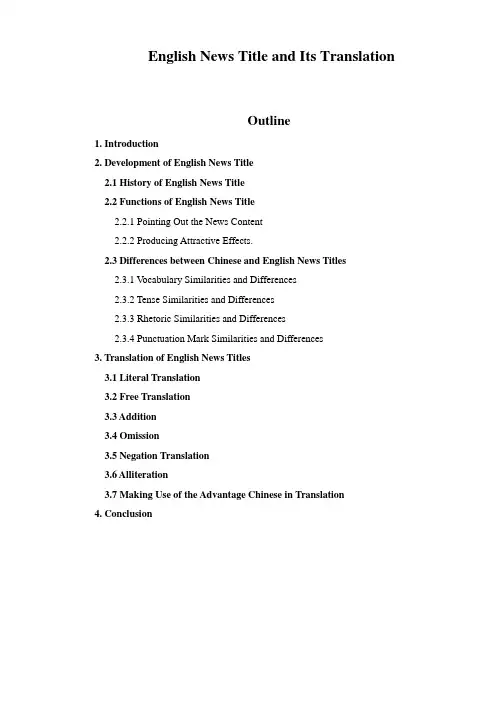
Outline1. Introduction2. Development of English News Title2.1 History of English News Title2.2 Functions of English News Title2.2.1 Pointing Out the News Content2.2.2 Producing Attractive Effects.2.3 Differences between Chinese and English News Titles2.3.1 V ocabulary Similarities and Differences2.3.2 Tense Similarities and Differences2.3.3 Rhetoric Similarities and Differences2.3.4 Punctuation Mark Similarities and Differences3. Translation of English News Titles3.1 Literal Translation3.2 Free Translation3.3 Addition3.4 Omission3.5 Negation Translation3.6 Alliteration3.7 Making Use of the Advantage Chinese in Translation4. Conclusion[Abstract] English news titles play a special role in news reporting. Thus we should place special emphasis on the research of the characteristics and translation of English news titles. This thesis focuses on the study of English news titles in terms of their grammatical features and its translation. When it comes to translation, it tries to reproduce the functions of English news titles which requires translators’ agility and ingenuity in applying semantic and rhetorical devices. With grammatical and semantic exploration into the English news titles, such studies strive to benefit the readers in their understanding of what the editor wants to convey.[Key words] English news title; function; comparison; translations methods英语新闻标题及其翻译[摘要]标题在新闻报道中具有独特的地位。
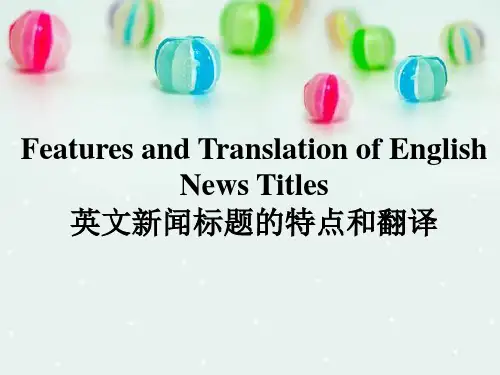
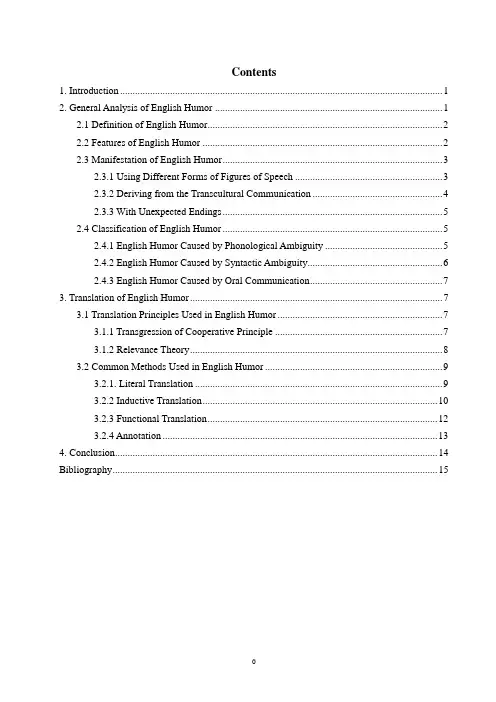
Contents1. Introduction (1)2. General Analysis of English Humor (1)2.1 Definition of English Humor (2)2.2 Features of English Humor (2)2.3 Manifestation of English Humor (3)2.3.1 Using Different Forms of Figures of Speech (3)2.3.2 Deriving from the Transcultural Communication (4)2.3.3 With Unexpected Endings (5)2.4 Classification of English Humor (5)2.4.1 English Humor Caused by Phonological Ambiguity (5)2.4.2 English Humor Caused by Syntactic Ambiguity (6)2.4.3 English Humor Caused by Oral Communication (7)3. Translation of English Humor (7)3.1 Translation Principles Used in English Humor (7)3.1.1 Transgression of Cooperative Principle (7)3.1.2 Relevance Theory (8)3.2 Common Methods Used in English Humor (9)3.2.1. Literal Translation (9)3.2.2 Inductive Translation (10)3.2.3 Functional Translation (12)3.2.4 Annotation (13)4. Conclusion (14)Bibliography (15)Brief Analysis of English Humor and Its Translation1.IntroductionThe connection of China and the world becomes increasingly close, which stimulates frequent communication in politics, economy and culture. Language, as a necessary tool for communication, plays an important role in our daily life. English humor is a special language art form that influences our lives deeply. Friedrich Engels (恩格斯) once believed that humor was consisted of the performance of wisdom and superiority in morals, and it required to be inspired by higher speculative ability and affluent imagination. English humor reflects the English characteristics and rules, which is not only related to the complicated and implicit language expressions, but also some given culture, history and social natural law. The study of English humor has been a long history. Most of the scholars both from aboard and home study it from different aspects, such as literature, art, sociology, logic, linguistics psychology and so on. However, not very many scholars specialize in the translation of English humor. As we know, understanding and appreciating of English humor are vital in translation of English humor, which definitely require strong language ability, reasoning ability and profound culture quality. Therefore, in order to easily understand and translate English humor, it is necessary to grasp the typical features of English humor. In view of this, the following parts will discuss some strategies and skills in translating English humor.2. General Analysis of English HumorHumor appears in books, magazines, movies, oral communications and TV shows. The successful interpretation of humor can bring laughter, relieve anxieties and improve people’s relationship. Generally, when we are confronted with humorous language we don’t have the urge to laugh. Why? There are three reasons. To begin with, we are not familiar with the English culture. Secondly, we are short of the method and mentality to understand and appreciate it. Last but not least, we don’t understand the characteristics and manifestations of English humor. In order to understand English humor, it relies not only on the understanding of the literal meaning, but also the implied meaning. The former is easy to grasp by native language speaker for it is separated from the language itself. While achieving the latter requires the reason and integration1咸阳师范学院2012届本科毕业论文of concepts. In order to appreciate English humor, we should at the very beginning realize the contradiction among speech act, behavior and incident, and then keep appropriate mental distance. Finally, we must have a good grasp of reading rhythm. The splendid part of humor is always placed at the end, so in reading or listening, we should pay more attention to having a pause to spare space to understand, which will help to possess the humorous effect. Thus humor is an interesting language phenomenon that deserves attention and study.2.1 Definition of English HumorResearchers past and present have put forward varied definitions about humor, but there is no consensus about it. It’s not easy to give coincident definition of humor owing to its abundant denotation and connotation. A good definition includes the quality to release laughter, the perceivers’ ability to be aware of , humorous effect, and, most importantly, the nature of humor.In Longman Dictionary of Contemporary English (2009), humor is defined as: a. the ability to understand and enjoy what is funny and makes people laugh; b. the quality of causing amusement.Where there is an act of humor, there must exist human participants who are capable of producing and noticing what is funny and laughable. Besides, there must be something happening or a funny stimulus which can amuse people. I consider that trying to be laughable or amusing is the essence of humor. So a sense of humor may be defined as a mental quality to produce, perceive and appreciate the utterance or action where amusements exist.2.2 Features of English HumorHumor is a special language art which decorates our daily life. The language form is concise, and the plot is mild and indirect. The witty and interesting contents make people cannot suppress a smile. English humor not only reflects the features and rules of the language, but inspires reader to contemplate after the laughter, which due to rich and varied national culture that involves profound life philosophic theory. The following examples will show these viewpoints.One day, the king asked Avanti(阿凡提), “If gold is placed on you left side and truth on the right side, which one will you choose?”“Majesty, I choose gold.” Avanti said. “How foolish you are,” the king laughed, “The treasure is nothing. However, it is difficult to get truth. Truth values most. If I were you, I would choose truth.”“Majesty, you are totally right.” Avanti said, “What2you lack is what you need. Each is in his proper place.” (各得其所)This joke typically presents the artistic features of English humor and its profound and deep connotation. Every single sentence itself seems like a puzzle and all the answers are full of extended meanings. The whole meanings reveal the main idea of the hero. We can see that what Avanti means is that the king is the pathetic one who is lack of truth (Wisdom or brains). He wanted to make fun of Avanti. However, Avanti realized that and found a way to fight back. On one hand, his answers did n’t offend the king so he won’t be punished. On the other hand, he satirized the king who hadn’t even realized it. However, readers can see through it and end this story with laughter.2.3 Manifestation of English HumorAs we know that English humor is a special language phenomenon. The language itself may be not so humorous, but it will produce humorous effect only when it is used in given language context. It is necessary for us learners to know about the commonly used manifestations of English humor: using different figures of speech; deriving form the translation communication; with unexpected endings.2.3.1 Using Different Forms of Figures of SpeechLanguage is a tool to express what one thinks and make most of rhetoric which is the art of language expression. The speaker can rely on different figures of speech to make the abstract questions be more specific, symbolizing and deep-going. These polished language art forms are effective ways to create humor. We can find them everywhere.Pun: It is an important and common figure of speech used in English humor, which ingeniously uses partial tone and ambiguous words to make the expression more implicit and mild. It takes advantage of one word or sentence that relates to two objects which include two meanings, one is the literal meaning, the other is extended meaning. However, the extended meaning is the main idea. So the humorous effect comes about.Eg.1 Two fish are swimming in Atlantic Ocean, suddenly, the great shadow covers them.First fish: “What a shadow! What can it be?”Second fish: “That’s the bottom of Queen Elizabeth.”First fish: “God, save the king!”In this example, “bottom” has two meanings. The literal meaning is the bottom of a ship,3咸阳师范学院2012届本科毕业论文and the extended meaning is people’s buttocks. The first fish understands that the huge “bottom”is the queen’s buttocks so that’s why the first fish shows its sympathy for the king. We are touched by its cute answers.Quick wit:It’s a kind of art used when people are in trouble, which needs wisdom and quick mind.Eg.2 A small boy leading a donkey passed by an army camp. A couple of soldiers wanted to fool the little boy. “Why are you holding on to your brother so tightly for, sonny?” asked one of the soldiers.”“So he won’t join the army.” The lad answered without blinking his eyes.Oh, how brilliant the boy is. The soldiers intended to humiliate the boy by calling him donkey. The boy was so brave and smart that he answered back without straight-forward words. His answer made the soldiers have nothing to say and brought disgrace on the soldiers’own head.Hyperbole: we can also use hyperbole to express extreme feelings. Here is an advertisement which is very impressive.“AHHHH, the jet age. Breakfast in Paris, dinner in H.K, and luggage in Peoria.” It delivers us a message that traffic today is so convenient and high-speed that we can go whatever we want in a very short time. At first sight, we maybe find it funny, but when we think twice, we think it’s reasonable.2.3.2 Deriving from the Transcultural CommunicationWhen people with different cultural background, custom and language communicate with each other, they are inclined to confront cultural shocks and cultural humor owing to their own cultural gap. As a result, many humors are derived from transcultural communication.For instance, in the movie Joy Luck Club, Waverly’s boyfriend Rich is going to visit his mother-in-law who is sharp-tongued and hard to please. For this reason Waverly had told him how to behave so as to try and make a favorable impression on her family, especially her mother. At first, everything is smooth, but when dinner time is coming, something goes wrong. Waverly forgot to tell Rich the Chinese table manners. When food is served on the table, he helps himself to the dish and ignores others. To make things worse, the last dish is Waverly’s mother’s best dish but Rich blows it. As usual, whenever Waverly’s mother serves her best dish, she always says that this dish is not salty enough, no flavor, it’s too bad to eat, but please! But he takes it and4thinks that the dish may be really awful. He says,“You know, Lindo, all it need is soy sauce.”Without any surprise, he get a bad impression.In this example, what impresses me most is the culture gap in daily life. Foreigners have little knowledge about our Chinese complicated table manners, so they tend to make mistakes during dinner. It’s Chinese tradition that senior starts eating then the others can start, which shows politeness and respect. Rich doesn’t know it. He helps himself during the dinner. Another mistake is that our Chinese are modest especially when talking about what we are really good at. However, Rich does n’t know that. He thinks Lindo said the dish is not salty enough, it’s true. So he adds soy sauce which totally ruins the delicious dish. At this scene, we burst into laughter and worry about Rich.2.3.3 With Unexpected EndingsNo matter what types of humor are, they have something in common, that is, they will lead people to change thinking pattern. In the process of creating humor, speakers will always illustrate a situation from some certain point of view, and then suddenly guide readers to see the situation from a completely converse viewpoint. Many humors begin with straight and plain narration which readers are used to thinking it in a normal way. However, when it comes to the end, the writer changes the plot that beyond readers’ imagination. For example, in the novel The Cop and the Anthem by O.Henry, the hero Soapy tries every means to attract the policeman’s attention in order to be thrown into prison. But he cannot get his wishes come true. Finally, he sits in front of a church hearing the anthem and makes up his mind to turn over a new leaf. To his surprise, it is then that he is caught by policeman and sent into prison. This kind of humor not only has a strong sense of satire but also prompts us to deep thought.2.4 Classification of English HumorThere are many kinds of humor caused by different factors. We can classify them into three kinds in order to get a clear and better understanding: English humor caused by Phonological Ambiguity; English humor caused by Syntactic Ambiguity; English humor caused by oral communication.2.4.1 English Humor Caused by Phonological AmbiguityThere are so many homonyms in English. We use the same pronunciation of two different words to achieve the unexpected and humorous effect. It is a very common way to generate5咸阳师范学院2012届本科毕业论文laughter.Eg.1 “My daughter has arranged a little piece for the piano.”“Good, it’s about time we had a little peace.”In this case, “piece” and “peace” have the same pronunciation. In this context, host wants to show off his daughter’s skill to play the piano for the guest but the guest wants to have a break. Maybe it sounds annoying so the guest doesn’t want to listen. When the host proposes to have a little “piece” the guest misunderstands it as “peace” so his answer is amusing.Eg.2 A teacher was giving all English lesson to a class of adults who had recently come to live in Australia. After placing some everyday objects on the table, she asked various members of the class to give her the pen, the book, the ruler and so on. Then she turned to an Italian student and said, “Give me the keys,” The man looked surprised. So she repeated, “Give me the keys.”The Italian student shrugged his shoulders. Then, throwing his arms around the teacher’s neck, he kissed her on both cheeks.This joke is generated by the fact that the student cannot tell the difference between /i/ and / i:/. The teacher wants the man to give her “keys” but the man thinks the word “keys” as “kiss”. So he kissed the teacher.2.4.2 English Humor Caused by Syntactic AmbiguityIn some context, what you said have been misunderstood by others so their answers sometimes have nothing to do with your question or even embarrass you.Eg.1 A: Could I try on the trousers in the window?B: You can if you want, sir, but we do have a dressing room.The customer said “in the window”means the trousers that in the window. But what the salesman thinks is that the customer wants to try on the trousers in the window. So the salesman said “sir, you can if you want.”Eg.2 A: “My students appreciate me, do yours?”B: “I wouldn’t know, I have never heard them mention your name.”Look at this one, we can’t help laughing. Ellipsis causes a problem. A said “D o yours” that intents to mean that do you students appreciate you too. B thinks it means do your students appreciate me? So he replied that answer which may hurt the feelings of A. It is a little embarrassed.62.4.3 English Humor Caused by Oral CommunicationDifferent people differ in oral English, they have various speaking speed and tone. As the message is passing, listener and speaker have different perceptual skill. That is how humor engenders.Eg.1 A: He is a nice man. 他是一个好人。
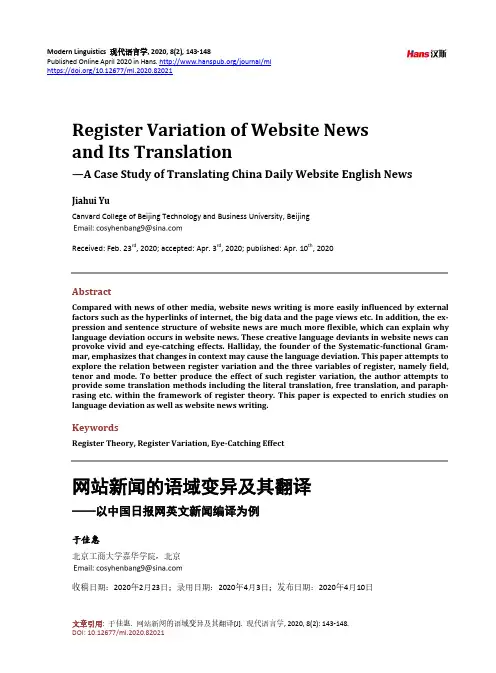
Modern Linguistics 现代语言学, 2020, 8(2), 143-148Published Online April 2020 in Hans. /journal/mlhttps:///10.12677/ml.2020.82021Register Variation of Website Newsand Its Translation—A Case Study of Translating China Daily Website English NewsJiahui YuCanvard College of Beijing Technology and Business University, BeijingReceived: Feb. 23rd, 2020; accepted: Apr. 3rd, 2020; published: Apr. 10th, 2020AbstractCompared with news of other media, website news writing is more easily influenced by external factors such as the hyperlinks of internet, the big data and the page views etc. In addition, the ex-pression and sentence structure of website news are much more flexible, which can explain why language deviation occurs in website news. These creative language deviants in website news can provoke vivid and eye-catching effects. Halliday, the founder of the Systematic-functional Gram-mar, emphasizes that changes in context may cause the language deviation. This paper attempts to explore the relation between register variation and the three variables of register, namely field, tenor and mode. To better produce the effect of such register variation, the author attempts to provide some translation methods including the literal translation, free translation, and paraph-rasing etc. within the framework of register theory. This paper is expected to enrich studies on language deviation as well as website news writing.KeywordsRegister Theory, Register Variation, Eye-Catching Effect网站新闻的语域变异及其翻译——以中国日报网英文新闻编译为例于佳惠北京工商大学嘉华学院,北京收稿日期:2020年2月23日;录用日期:2020年4月3日;发布日期:2020年4月10日于佳惠摘 要和其他新闻媒介相比,网站新闻易受超链接、大数据、浏览量等外部因素的影响。
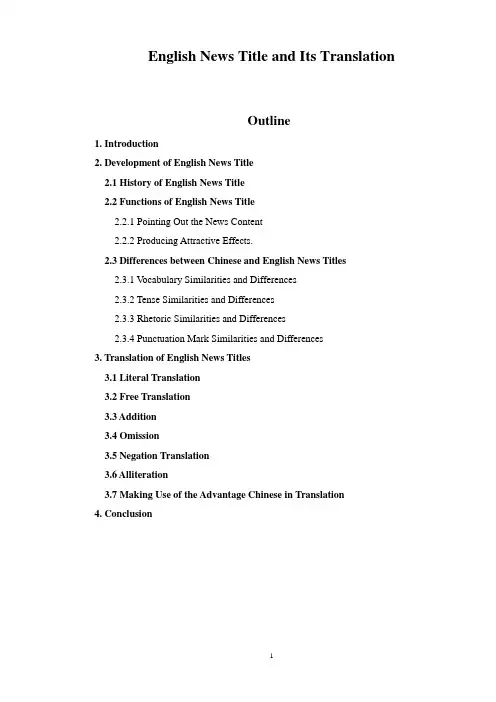
Outline1. Introduction2. Development of English News Title2.1 History of English News Title2.2 Functions of English News Title2.2.1 Pointing Out the News Content2.2.2 Producing Attractive Effects.2.3 Differences between Chinese and English News Titles2.3.1 V ocabulary Similarities and Differences2.3.2 Tense Similarities and Differences2.3.3 Rhetoric Similarities and Differences2.3.4 Punctuation Mark Similarities and Differences3. Translation of English News Titles3.1 Literal Translation3.2 Free Translation3.3 Addition3.4 Omission3.5 Negation Translation3.6 Alliteration3.7 Making Use of the Advantage Chinese in Translation4. Conclusion[Abstract] English news titles play a special role in news reporting. Thus we should place special emphasis on the research of the characteristics and translation of English news titles. This thesis focuses on the study of English news titles in terms of their grammatical features and its translation. When it comes to translation, it tries to reproduce the functions of English news titles which requires translators’ agility and ingenuity in applying semantic and rhetorical devices. With grammatical and semantic exploration into the English news titles, such studies strive to benefit the readers in their understanding of what the editor wants to convey.[Key words] English news title; function; comparison; translations methods英语新闻标题及其翻译[摘要]标题在新闻报道中具有独特的地位。
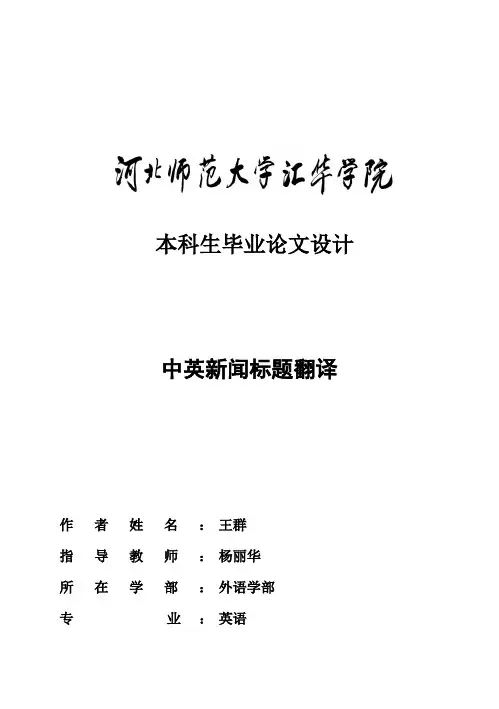
本科生毕业论文设计中英新闻标题翻译作者姓名:王群指导教师:杨丽华所在学部:外语学部专业:英语班级(届):2009届3班二〇一三年四月二十二On the Translation of Chinese and English News HeadlinesByWang QunSupervisor Prof. Yang LihuaA ThesisSubmitted to the Foreign LanguagesSchoolIn Partial Fulfillment of the RequirementsFor the Degree of Bachelor of ArtsAt Hebei Normal UniversityContentsAbstract (English) (ii)Abstract (Chinese)............................................................................................. iii Introduction (1)Chapter 1 Brief Introduction of English News Headlines (3)1.1 Definition of English News Headlines (3)1.2 Functions of English News Headlines (4)1.3 Features of English News Headlines (6)Chapter 2 Comparison Between Chinese and English News Headlines (10)2.1 Differences between Chinese and English News Headlines (10)2.2 Similarities between Chinese and English News headlines (15)Chapter 3 Translation of English News Headlines (16)3.1 Difficulties of English News Headlines Translation (16)3.2 A Brief Review on Translation Criteria (17)3.3 Criteria of English News Headlines Translation (18)3.4 Strategies and Tactics of English News Headlines Translation (20)Conclusion (2)5 Bibliography (26)AbstractWith deepening of the reform and opening up policy and entry into the WTO ,the Chinese are eager to know the world. A large number of information is transmitted by news media especially news reports.The essential part of news report is headline. Sometimes people don‘t have enough time to read the whole news from the beginning to the end, most readers would like to know as much as they can in the shortest time. Therefore , it can be concluded that the headline plays a very important role on news reporting, and we must pay more attention to the translation of news headline.This paper mainly introduces some translating skills according to the features of English news headlines. There are three parts in this paper. In chapter one, it introduces the definition, function, classification and features of English news headline. In chapter two, it introduces the differences and similarities between English and Chinese news headlines. The problems appeared in English news headline translation are introduced in the last chapter. In the end of this paper, it has a conclusion of the content .To sum up, this paper hopes to find a appropriate way of English news headline translation by discussing of the features, functions and the criteria of English news headline translation.Key words: journalistic English; headlines; features; criteria; translationtactics摘要随着改革开放的进一步深化以及中国加入世界贸易组织,中国与西方国家的交流与联系也越来越频繁。
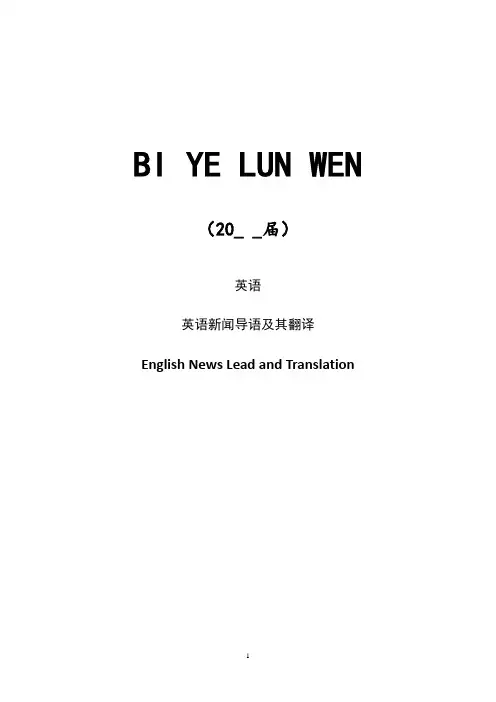
BI YE LUN WEN(20_ _届)英语英语新闻导语及其翻译English News Lead and TranslationContentsAbstract (4)1 Introduction (5)2 Lead (6)2.1 The inverted pyramid form (6)2.2 Development of lead (7)2.3 Characteristics of lead (8)2.3.1 Information concentration (8)2.3.2 Compact syntax (9)2.3.3 Dateline and news source (9)3 Translation of Lead (10)3.1 Separation and combination (11)3.2 Restructuring of information (12)3.3 Changing the position of news source (13)3.4 Changing the form of time (14)3.5 Backgrounding (14)4 Conclusion (15)Bibliography (16)Acknowledgements (17)摘要本文以英语新闻导语作为研究对象。
先简要介绍新闻的广义与狭义的定义,分类和体裁。
新闻报道作为最广泛使用的一种新闻体裁,通常由标题、导语和正文三部分组成。
倒金字塔结构作为新闻报道最通用的写作结构,它的问世带动了导语的发展,先后产生了三代导语,并且在今天仍不断地向着多样化的方向发展,呈现出百花齐放的局面。
导语在新闻中的作用日渐显著,它的发展丰富了新闻的内容,使新闻更具有可读性。
导语大体上分为直接性导语和延缓性导语。
导语信息浓缩,句法紧凑,注明电头和消息来源。
本文的研究重点为导语的翻译策略,根据导语的特点,结合中英新闻导语的差异,翻译导语过程中需要采用拆分与整合,信息重组,消息来源位置置换,更换时间的表达形式和背景解释等策略。
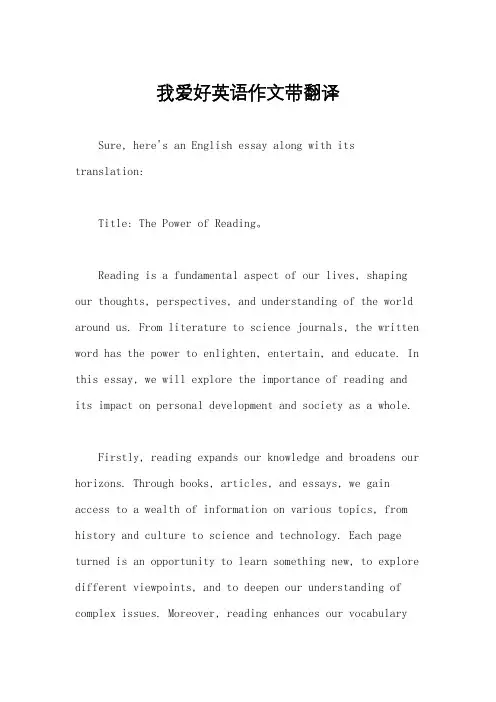
我爱好英语作文带翻译Sure, here's an English essay along with its translation:Title: The Power of Reading。
Reading is a fundamental aspect of our lives, shaping our thoughts, perspectives, and understanding of the world around us. From literature to science journals, the written word has the power to enlighten, entertain, and educate. In this essay, we will explore the importance of reading and its impact on personal development and society as a whole.Firstly, reading expands our knowledge and broadens our horizons. Through books, articles, and essays, we gain access to a wealth of information on various topics, from history and culture to science and technology. Each page turned is an opportunity to learn something new, to explore different viewpoints, and to deepen our understanding of complex issues. Moreover, reading enhances our vocabularyand language skills, improving our ability to communicate effectively and express ourselves eloquently.Secondly, reading stimulates our imagination and creativity. As we immerse ourselves in the pages of a novel or the lines of a poem, we enter worlds crafted by the author's words, where anything is possible. We visualize characters, settings, and events, creating vivid mental images that transport us to distant lands and distant times. This imaginative exercise not only provides us with entertainment but also fosters our creativity, encouraging us to think outside the box and envision new possibilities.Furthermore, reading fosters empathy and compassion. When we read stories about people from different backgrounds and cultures, we gain insight into their lives, experiences, and struggles. We walk in their shoes, experiencing their joys and sorrows, and in doing so, we develop a greater appreciation for the diversity of human existence. This empathy cultivated through reading fosters understanding and tolerance, bridging the gaps that divide us and fostering a more inclusive and compassionate society.In addition, reading improves critical thinking and analytical skills. As we engage with complex texts and wrestle with challenging ideas, we learn to question, evaluate, and analyze the information presented to us. We become more discerning readers, able to separate fact from fiction, truth from propaganda, and sound arguments from fallacious ones. This ability to think critically is essential in today's information age, where misinformation and fake news abound, empowering us to make informed decisions and navigate the complexities of the modern world.In conclusion, reading is not merely a hobby but a powerful tool for personal growth and societal progress. It enriches our minds, expands our horizons, and cultivates essential skills that are invaluable in both our personal and professional lives. Therefore, let us embrace the habit of reading and celebrate the transformative power of the written word.Translation:标题,阅读的力量。
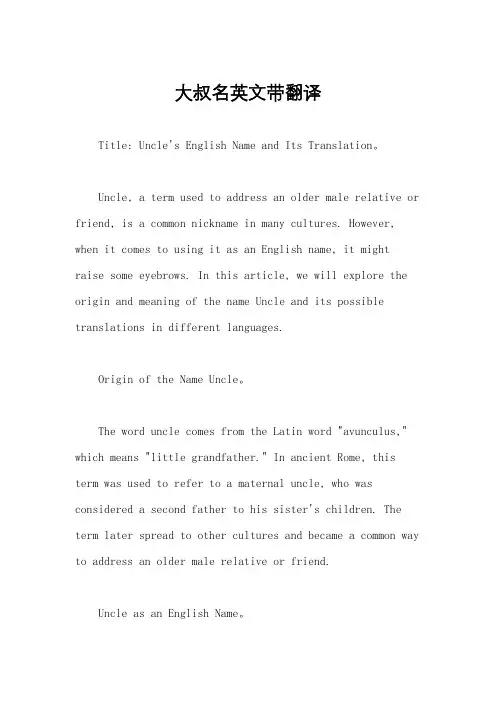
大叔名英文带翻译Title: Uncle's English Name and Its Translation。
Uncle, a term used to address an older male relative or friend, is a common nickname in many cultures. However, when it comes to using it as an English name, it might raise some eyebrows. In this article, we will explore the origin and meaning of the name Uncle and its possible translations in different languages.Origin of the Name Uncle。
The word uncle comes from the Latin word "avunculus," which means "little grandfather." In ancient Rome, this term was used to refer to a maternal uncle, who was considered a second father to his sister's children. The term later spread to other cultures and became a common way to address an older male relative or friend.Uncle as an English Name。
Using Uncle as an English name is not common, but it is not unheard of. Some people might choose it as a nickname or a personal brand, while others might use it as a given name. The name Uncle is more popular in the United States than in other English-speaking countries, and it is mostly used by African Americans.Translation of Uncle in Different Languages。
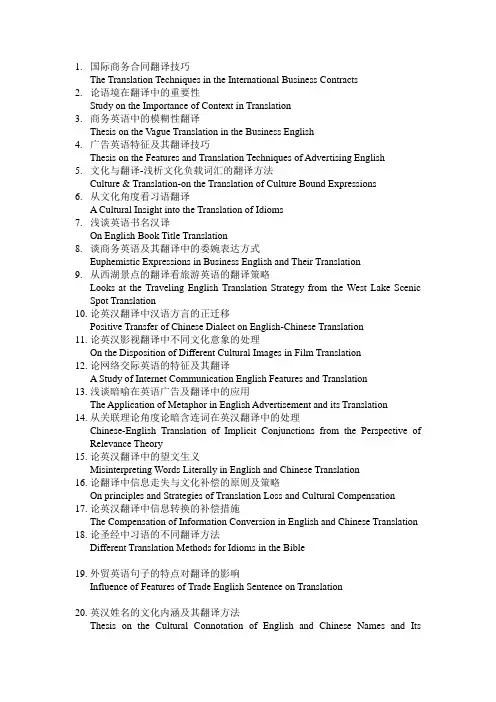
1.国际商务合同翻译技巧The Translation Techniques in the International Business Contracts2.论语境在翻译中的重要性Study on the Importance of Context in Translation3.商务英语中的模糊性翻译Thesis on the Vague Translation in the Business English4.广告英语特征及其翻译技巧Thesis on the Features and Translation Techniques of Advertising English5.文化与翻译-浅析文化负载词汇的翻译方法Culture & Translation-on the Translation of Culture Bound Expressions6.从文化角度看习语翻译A Cultural Insight into the Translation of Idioms7.浅谈英语书名汉译On English Book Title Translation8.谈商务英语及其翻译中的委婉表达方式Euphemistic Expressions in Business English and Their Translation9.从西湖景点的翻译看旅游英语的翻译策略Looks at the Traveling English Translation Strategy from the West Lake Scenic Spot Translation10.论英汉翻译中汉语方言的正迁移Positive Transfer of Chinese Dialect on English-Chinese Translation11.论英汉影视翻译中不同文化意象的处理On the Disposition of Different Cultural Images in Film Translation12.论网络交际英语的特征及其翻译A Study of Internet Communication English Features and Translation13.浅谈暗喻在英语广告及翻译中的应用The Application of Metaphor in English Advertisement and its Translation14.从关联理论角度论暗含连词在英汉翻译中的处理Chinese-English Translation of Implicit Conjunctions from the Perspective of Relevance Theory15.论英汉翻译中的望文生义Misinterpreting Words Literally in English and Chinese Translation16.论翻译中信息走失与文化补偿的原则及策略On principles and Strategies of Translation Loss and Cultural Compensation17.论英汉翻译中信息转换的补偿措施The Compensation of Information Conversion in English and Chinese Translation 18.论圣经中习语的不同翻译方法Different Translation Methods for Idioms in the Bible19.外贸英语句子的特点对翻译的影响Influence of Features of Trade English Sentence on Translation20.英汉姓名的文化内涵及其翻译方法Thesis on the Cultural Connotation of English and Chinese Names and ItsTranslation Methods21.浅谈英语谚语翻译Thesis on the Translation of English Proverb22.浅析文化语境对翻译的影响Study on Influence of Cultural Context on Translation23.从庞德英译汉诗《长干行》看其意象派风格Ezra Pound's Imagist Style in Translating a Chinese Poem As Seen from The River-Merchant's Wife:A Letter24.中国高校名称的翻译The Translation of the Names of Universities in China25.语境对英汉翻译措辞的影响The Influence of contexts on the Diction of English-Chinese Translation26.从好了歌评两种不同的翻译风格Thesis on the different translation style from the A Dream of Red Mansions27.中西社会风俗差异及其翻译On the Discrepancies of Translation between Western and Chinese Social Custom 28.中文电影片名的英文翻译分析The Analysis of English Translation about Chinese Film’s Title29.从编译理论看新闻翻译中的译者主体性On the Function of Translator's Subjectivity in Translation of News from Compiler Theory30.谈汉语流行词的中英文翻译Chinese Popular Neologisms and Their Translation31.《浮生六记》中特定文化词语的翻译On Translation of Culture-Specific Concepts in Six Chapters of a Floating Life 32.汉英方位词的文化对比与翻译—从“东西南北”与“east,west,south,north”谈起Cultural Contrast and Translation of Chinese and English Location Words-with Special Reference to “Dong, Xi, Nan, Bei”and “East, West, South, North”33.中文公共标识的英语翻译On Translating Chinese Public Signs into English34.英汉商标翻译原则Brand Translation Principle in English-Chinese35.英汉口译技巧Oral Interpretation Skills from English into Chinese36.论韦利的论语英译On Waley’s Translation of the Analects37.中英文化差异对翻译的影响Effects of Cultural Differences on Translation38.影视字幕翻译刍议On Translation of Subtitles of English-Language Films39.On Formal Correspondence of C/E Translation in Terms of Hypotaxis &.Parataxis从形合和意合看汉英翻译中的形式对应40.How to Decode and Translate the Ambiguous Structures歧义结构的解码与翻译41.Pragmatics and Advertisement Translation, with Special Emphasis on E/CCultural Differences英汉文化差异与广告的语用翻译42.Context and Business Discourse in English and Chinese43.On the Peculiar ways of Expression in Dicken’s Novels试论狄更斯小说独特的艺术手法44.Female Images in the Sun Also Rises 论《太阳又升起了》小说中女性形象45.Standarization of English: The Necessity and Feasility in an Age of Globaliztion全球化时代英语标准化的必要性和可能性46.On English Translation of Public Signs in Chinese 再谈汉英公示语翻译----以2010年亚运会主办城市广州为例47.Brief Appreciation on “Venice Merchant”48.The Mannered Language of English49.On the Properties of Idiomatic Expressions in English50.The Differences and Samilarities Between Structural Ambiguity in English andChinese51.Time Conception in Different Cultures52.On American Religion53.On Title Translation of English Film and Disc54.The Characteristics and the Rhetorical Roles of English ReduplicativesNeiterativesparisons of Multiplicity in Chinese and English and Its Translation56.A Study of Hmorous Utterances Form the Perspective57.The Current State and Prospects for English Teaching58.The usage of “And”59.A Survey on Culture and Social Life in USA60.Inheretance and Development of National Language and Culture61.Implicitness and Explicitness in Translation62.谈英语谚语的翻译63.谈英语幽默的翻译64.地方名胜古迹汉译英65.翻译中常见错误分析66.中英思维方式的差异对翻译的影响67.会话含义的推导与翻译68.词汇的文化内涵与翻译69.语境在翻译中的作用70.商标词翻译71.广告语言的翻译72.论英汉互译中的语义等值问题73.英汉文化差异对翻译的影响74.英汉谚语的理解和翻译75.浅谈颜色词在英语中的翻译76.中西文化差异与翻译障碍77.英语比喻性词语中文化内涵及翻译78.英语意义否定表现法及其汉译79.浅谈新闻标题的翻译80.从历届韩素音青年翻译奖竞赛看翻译人员所应具备的素质81.论品牌名称翻译的原则和方法82.影视作品字幕翻译的技巧83.归化与异化——《飘》不同译本的比较研究84.旅游景点翻译存在的问题与处理方法85.英语新闻的特点与翻译技巧86.中国特色时事词汇及其英译87.中国饮食文化翻译存在的问题与策略88.英汉委婉语的比较研究与翻译策略89.英汉产品说明书的特点与翻译技巧90.浅谈如何融翻译教学于英语教学91.《傲慢与偏见》不同译本比较研究初探92.文学作品中文化负载词的翻译技巧93.口译技巧、言外知识与语言基本技能三位一体的口译学习法94.论笔记中符号与缩略词对连续传译质量的作用95.论交替传译中笔记对“达”的影响96.论笔译教学与口译教学的结合97.网络英语的特点和翻译方法98.城市标识用语英译错误及翻译策略99.论商务文本的特点和翻译策略100.The Social and Cultural Factors in Translation Practice101.On Translation Methods of Numeral in Chinese and English102.The Comparison and Translation of Chinese and English Idioms and their Tranlations103.Cultural Equivalence in Translation104.On the Cross-cultural Pragmatic Failure in E/C Translationparative Study of Two Basic Translation Methods—Literal Translation and Free Translation106.Learning a Foreign Language Through Translation107.On Translating the Passive V oice in English for Science and Technology 108. A Comparative Study of Two English Version of The XXX109.Review on the Translation of Movie Titles110.Remarks on the Translation of Chinese Set-phrase111.Application of Contrastive Analysis in Long Sentences。
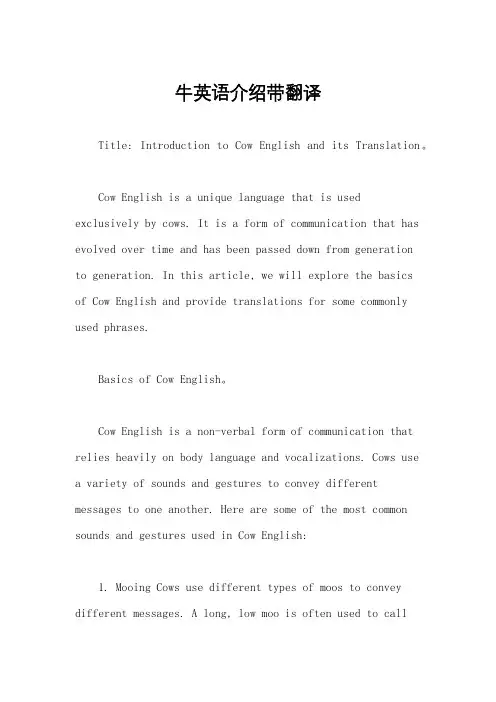
牛英语介绍带翻译Title: Introduction to Cow English and its Translation。
Cow English is a unique language that is usedexclusively by cows. It is a form of communication that has evolved over time and has been passed down from generationto generation. In this article, we will explore the basicsof Cow English and provide translations for some commonly used phrases.Basics of Cow English。
Cow English is a non-verbal form of communication that relies heavily on body language and vocalizations. Cows use a variety of sounds and gestures to convey different messages to one another. Here are some of the most common sounds and gestures used in Cow English:1. Mooing Cows use different types of moos to convey different messages. A long, low moo is often used to callout to other cows, while a short, sharp moo can be a warning sign.2. Head Tossing When a cow tosses its head, it can meana variety of things. It may be a sign of aggression or frustration, or it may be a way to signal to other cowsthat it is time to move on.3. Tail Flicking A cow's tail can also be a good indicator of its mood. If a cow is flicking its tail, it may be feeling agitated or annoyed.4. Ear Position Cows can move their ears in different directions to signal different things. For example, if a cow's ears are pointed forward, it may be listening intently. If they are pointed backwards, it may be a sign of aggression.Translations of Common Phrases。
英语报道作文模板翻译Title: English news article template translation。
Translation of the article template:Introduction: The introduction should provide a brief overview of the topic and grab the reader's attention. It should include the main points of the article and set the tone for the rest of the piece.Body: The body of the article should be divided into several paragraphs, each focusing on a different aspect of the topic. Each paragraph should contain a topic sentence that introduces the main idea, followed by supporting details and examples. The body should provide a comprehensive and balanced view of the topic, covering different perspectives and opinions.Conclusion: The conclusion should summarize the main points of the article and provide a closing statement. It should leave the reader with a clear understanding of the topic and possibly a call to action or further consideration.Language: The language used in the article should be clear, concise, and engaging. It should be appropriate for the target audience and convey the information in an accessible manner. Avoid using jargon or overly technical language unless necessary for the topic.References: If the article includes any facts, statistics, or quotes, it should provide proper references to the sources. This adds credibility to the article and allows readers to verify the information.Editing: The article should be carefully edited for grammar, spelling, and punctuation errors. It should also be reviewed for clarity, coherence, and overall flow. A well-edited article enhances the reader's experience and reflects positively on the publication.By following this template, writers can create engaging and informative English news articles that effectively communicate the intended message to the audience.Whether reporting on current events, analyzing trends, or providing in-depth features, a well-structured article can captivate readers and leave a lasting impression.。
山东大学硕士学位论文新闻报道及其翻译—英译汉举要姓名:***申请学位级别:硕士专业:英语语言文学指导教师:***20040330.兰茎呈姜茎至耋耋坠婆圣竺!摘要本文以语言学,文体学,翻译学为基础,分析了新闻英语的各种特点,旨在归纳总结出新闻英语翻译的标准与实践技巧.全文莱分五章第一章简要介绍了新闻英语的概况及其翻译的必要性和困难在国内外知名学者提出种种观点的基础上,作者将“新闻”一词定义如下:新闻是最近发生的一个或一系列事件的最新消息,或见诸报刊或以广播电视的形式予以报道这里介绍了新闻价值的七大要素以及新闻几种流行的分类新闻报道常有一个线形结构:导语和正文本章对新闻英语翻译的必要性和困难也进行了简要介绍第二章着重探讨了新闻翻译的基本原则和文化因素对新闻翻译的影响新闻英语是一种特殊的文体,在翻译上也有自己的特点新闻英语翻译的主要功能就是传播信息,起到交流的作用,使受众及时了解世界上新近发生的事件.因此,本文对纽马克的交际翻译理论和语义翻译理论对新闻翻译的指导作用进行了探讨尤其应强调的是信息的准确传递.第二个方面论述了文化因素对新闻翻译的影响翻译是语言的转换,也是文化的移植(译者在翻译过程中不仅会遇到中英两种语言的问题,也会遇到文化问题新闻英语包罗万象,对文化因素的处理关系到翻译的成败V∥。
D第三章阐述了新闻英语的词法特征以及词的翻译为保证新闻报道的可读性,普遍采用简单短小而又熟悉的小词新闻记者倾向于使用短词而非长词小词看似容易,翻译起来不容易对付.为了增强新闻的新鲜感,记者们常常会或炮制或采用一些新词.【本文揭示了新词的来源并试着从构词法方面进行分析并对新词的翻译技巧作了简单的概括借用人名、物名或地名来代替该国或其政府及有关机构是新闻报道中最普遍的现象新闻英语的另一大特色是经常掺用外来语,尤其是新闻记者提及外国或新近出现的事物时,以引起读者兴趣或更贴切的表达某词汇的内涵.卜'6第四章从句法层面分析了新闻英语并从大量实例中探讨了句子翻译c;Blocklanguage”是小旬的一种,与~般从句不同的是它省略了信息价值较小的功能词.心的使用让标题获得电报似的快节奏,从而更为生动“过渡语就象沙浆一样将各个部分粘合起来使文章成为一个整体”O出ncher,1994:146)在各种过渡语中最为普遍的是连词本文着重以“and”为例阐释了新闻英语中连词的翻译主动态在新闻英语中倍受青睐,因为它可以带给读者直接感大量使用引语(包括直接引语、间接引语)是新闻报道的另一个句法特点,这可以避免记者有任何偏见、t从而赋予新闻报道最大的客观性在从事新闻翻译时,也应遵循这些原则r第五章从修辞方法上对新闻英语的特点及其翻译进行了探讨修辞手段的运用成为当今新闻英语语篇的灵魂它能积极的随情应景的运用各种表现方法,使新闻报道具体形象,鲜明突出,增加新闻的可读性、生动性和吸引力本章主要从语音、词汇和句法三个层面,运用新近外于0中的大量实例对修辞手法极其翻译进行了论述语音方面着重阐述了头韵和半韵词汇层面探讨了暗喻、对照、幽默和仿拟.句法层面涉及到出现率较高的重复和排比两种手法修辞手法的翻译也不是简单的任务,它涉及到文化因素的处理和内容与形式的统一问题,译者需考虑到多重因素,以求做到最忠实和最优美关键词:新闻英语;翻译;文体分析,曩.¨i:,AbstI氇ctThe口resentmesis,b鹞edonstylistics,IingLIisticsandtransIatoIo肼isto锄dyzethefb咖resofⅡ州sEngli啦so8stogeneralizeandestablishcrit酣aandpracticaltec陋quesofnewsEnglishtranslation.ThewholethesisisdiVidedimofiVech印ters·ChapterOnetouchesuponthegene叫aspectsofnewsEnglishandⅡledi衢cuIties船dsi鲷馒canceofitstraJlslation.Ba∞donmanyideasputfornlbyr锄ownedjoumalistsathomeazldabroad,theauthord面nesnewsasnewinfo哪ationabOuta咖entevent0reve呲swhjchispreselltedinnewsp印ersa11dmagazinesorbmadcastonradio锄dTVSevenfactorsofnewsvalueandsomepopularnewsclassificationsareintrDduced.NewsstoriesalwayshavealinearstmchJre:thelead觚dthebodyThenthet11csjsproceedsto西vcabriefSurveyofthedifficultiesands噜11i打canceofnewsEnglisht瑚slationCh印t盯Twode址swiththeprinciplesofnewsEI培1isht伽slationandtheinfluencesofculmraJelementsuponthe订aIlslationNewsEnglishisaspecialwritiⅡgstyle.Soithsitsownfeanlresin胁slaljOn,耵lemainmnctjonofnewsEngJishtraIlslationistoSpreadinJ’ofmation.FromnewsthereaderscanknowthenewesttIlingsllappenedintheworld.Tllis曲apterexplorest}leguidanceofNewmark’s“comrnunicative仃anslation,’卸d“semantictranslation”theorytothe仃anslationofnewsEngJish.Andespeciallytheaccurateconveyallceoftheo—ginalmeaningshouldbestressed.Thesecondisabouttheinnuenceofculturalelementsuponthetra璐lation.TransI砒ionisthetransmissionbetweendiffbre眦languages,姐daIs0thet浊硌pI龇ofdi氐re】吐culmres.The锄msIatofmyencounterthed商cuItiesoflanguageaswell弱cuhraleIements.NewsEnglishembracetheknowledgeofallfields.Sohowtodealwiththecuhralinnuenceis㈣ia【fbragood虹anslato【Chapt盯Threeistoanalyzethelexicalf宅咖resofn删sEnglishandthetranslationofwords.Midgetwordsaresimple,shortandf细maroneswhichdominateneWsst耐estoeIl汕‘ethereadabil时Newsr印oners0rwmerstendtoprefhshononestolOng∞笛.See玎[1inglyeasytoh瓶dleasfhmiliarwordsare,theyareinr髓litynotsimpIe.Neologismare仃equentIyadoptedorcoinedbyjoumaliststoincreasethes∞seof£瞻shness.Thepresent也esisistoex口lainthesourceofneologism,andtryto姐alyzehfbmtheword-fomationperspective.Somesl(i11softranslatiI培neologismarebr主enyintroduced.kisye哆commoninnewsreportsthatttlen锄eofitscap“aLn砒ioIl’govemmem,orinstinnionisusuaJlyindicatedbyfe咖他ofnewsEnglishiswell.1【Ilawnarchite嘶lre,orheadofgov锄mentAnothertouseforeignwords.EspeciallywhenrepOrtersmemiOnsomenewttlingsOr疳Dmforeigncoun砸es’theyuSuallytaI【etheminordertoattraccthereaders’imerestingorexpresssOmewOrdsmOresubtlyChapterFourprobesimonewsEn91ishonthes”tacticIevelanddiscussesthen锄slationofsemellcesbygiving蛐myex锄ples.‘‘Blockl锄guage',isa啪eofno加alclausepatteminomming旬nctionminDrsentence,wllichd嫡电rs疔omthewordsoflowinfonIlationvalue。
推荐英语作文及翻译Certainly! Here's an English essay along with its translation:Title: The Importance of Continuous Learning。
In today's fast-paced and ever-changing world, the significance of continuous learning cannot be overstated. With advancements in technology, shifts in global markets, and evolving societal norms, individuals who embracelifelong learning are better equipped to navigate the complexities of modern life and achieve success in their personal and professional endeavors.Continuous learning fosters adaptability and resilience, enabling individuals to thrive in dynamic environments. By actively seeking out new knowledge and skills, individuals can stay ahead of the curve and remain competitive in their respective fields. Moreover, learning enhances cognitive abilities and critical thinking skills, empoweringindividuals to solve complex problems and make informed decisions.Furthermore, continuous learning promotes personal growth and fulfillment. Engaging in learning activities not only expands one's intellectual horizons but alsocultivates a sense of curiosity and passion for exploration. Whether it's learning a new language, mastering a musical instrument, or delving into a new subject area, the process of learning enriches our lives and adds depth to our experiences.In the professional realm, continuous learning is essential for career advancement and professional development. In today's knowledge-based economy, employers value employees who demonstrate a commitment to learningand self-improvement. By investing in ongoing education and training, individuals can enhance their job prospects, increase their earning potential, and unlock new opportunities for growth and advancement within their chosen field.Moreover, continuous learning contributes to societal progress and innovation. As individuals acquire new knowledge and skills, they become catalysts for positive change within their communities and beyond. Whether it's developing groundbreaking technologies, advocating for social justice, or addressing pressing global challenges, lifelong learners play a pivotal role in driving innovation and fostering positive social change.In conclusion, continuous learning is not merely a choice but a necessity in today's rapidly evolving world. By embracing lifelong learning, individuals can adapt to change, achieve personal and professional growth, and contribute to the advancement of society. As the famous Chinese proverb goes, "Learning is a treasure that will follow its owner everywhere." Let us, therefore, embrace the journey of learning and unlock the endlesspossibilities that await us.Translation:标题,持续学习的重要性。
外语学院往届本科毕业论文选题汇总表2000级毕业论文选题(169题)1.Cultural Connotation of Words and Their Translation2.On Translation of Tourist Material3.Domestication and Foreignization on Literary Translation4.Translation as a Language Teaching Technique5.On the Translation of Kinship Terms in A Dream of Red Mansion in the Cultural Perspective6.Translation of Proverbs That Have Cultural Connotation7.The Rhetoric Characteristic of English Advertisement and its Translation Methods 8.On Application of Presentation of Lesson Plan in English Teaching and Its Significance9.The Application of the Body Language inForeign Language Teaching10.The Linguistic Characteristics of Advertising English11.On the Combination of the Theory and Practice in Presentation of Teaching Plan 12. A Talk on Social and Cultural Connotation between Chinese and English V ocabulary13.An Effective Way of Rapid Command of Journalistic English in Listening14.Characteristics of Newspaper English15.Improvement in Listening Ability for English Majors16.Improvement in Speaking Ability for English Majors17.Structural and Lexical Characteristics of News18.Lexical of Journalistic English19.Improvement in Listening Ability for English Majors20.Improvement in Speaking Ability for English Majors21.Improvement in Listening Ability for English Majors22.Improvement in Speaking Ability for English Majorsparison of Vocabulary, Morphology and Usage Between British English and American English24.The Theories and Methods of the Translation of Movie Names25.Pragmatics and Translation26.An Analysis of the Implying Feminism in Jane Eyre27.The Characteristics of EMMA28. A Comparative Study of English and Chinese Proverbs29.Advanced Modern Woman ---Ursula –Character Analysis of the Rainbow30.The Characteristic of Jane Eyre31.An Analysis of the theme of Vanity Fair32.Narrative Feature in Dickens’ Works33.EA T OR BE EA TEN --an Analysis of the Significance of THE CALL OF THE WILD34.The Women’s Consciousness in Pride and Prejudice35.Translation of Idiom with Numbers Through Culture Difference36.On English Structural Ambiguity37.The Application of Group Learning in English Teaching38.How to Present New English Vocabulary in Classroom39.Attention—the Main Factor Affecting English Classroom Teaching40.The Function of Teachers’Feedback in English Composition41.On the Comprehensive Quality of Foreign Language Teachers42.Teachers ---the Main Factor Affecting English Classroom Teaching43.On the Cultural Connotation of English Proverbs44.The Learning Strategies of Good Language Learner45.The Task-based Approach in EnglishV ocabulary Teaching46.Affective Factor Affecting English Classroom Teaching47.The Study on the Combination of Modern Educational Technology and Task-based Foreign Language Learning48.The Misconceptions of Communicative English Teaching in Middle School49.Making Students Learning on Their Own Initiative50.On the Subtlety and Restraint that Mark Emily Dickinson’s Poem51.Analysis the Characters of Elizabeth Bennet52.On the Poetic Features of Leaves of Grass53.Henry’s Realist Writing and His Ending Art54.On O.Henry’s Ending Art55.An Analysis on the Characters of Great Expectationsparison Between Poems by Dickinson and Those by Li Qingzhaoplexity and Profundity of Humanity--On the Characterization in Wuthering Heights58.Tomorrow is Another Day —Analysis on the Character of Protagonist of ―Gone with the Wind‖ by Margaret Mitchell59.Tess, a Victim of False and Confused Concepts of the Time60.An Initial Probe into the Tragic Meaning of Hamlet61.Introduction to Cultural Connotation in English Vocabulary Teaching62.Song of Myself—Embodiment of American Spirit63.Translation of Names and Cross-cultural Communication64.On Surname of English and Chinese65.The Conversion of Chinese and English Cultural Values in Dating Advertisements 66.Preliminary Study on the Culture of English and Chinese Names67.Across-cultural Contrastive Study ofEnglish and Chinese Metaphor68.Politeness in Stores69.How to Use EFL Resources70.The Principles and Skills of Translations of Business Advertisement71.Stylistic Features and Translation of Advertisement72.Promoting Learner Autonomy in the EFL Classroom73.Application of Multimedia in English Teaching74.Task-based Learning in English Language Teaching75.The Characteristics and Translation of Advertising Language76.The Internet and English Teaching77.The Features of News’ Headlines Subtitle: The Distinctive Features of Headlines in Journalistic English78.Application of Multimedia Computer in English Language Teaching79.The Teaching Strategy in English Reading80.Pragmatic Failures in Daily Conversation of Interculture81.The Differences between Chinese and English Body Language82.Cultural and Pragmatic Differences between Chinese and English in Intercultural Communication83.How to Shift Student from Passive to Initiative in English Class84.Application of Decode Theory in Listening Comprehension85. A Study of the Theory of Second Language Acquisition Applied in Bilingual Education in China86.Individualism in USA and China87.On Improving English Communicative Ability88.English Reading and Culture89.Influences of Cultural Differences on Oral English Learning90.The Necessity of the English Testing Reform91.Cultural Connotations of Color Words in English and Chinese92.On Improving Student’s Oral English93.Discussing the Study of English Phonetics94.Oral English Learning Environment95.Paul and Miriam’s Love Tragedy96.Analyses on Heathcliff’s and Catherine’s Character Images from the Stylistic Angle97.Morality in ―Lady Chatterley’s Lover‖98.Polarized Love and Man-Woman Relationship Probe into Lawrence’s Viewpoint on Love99.Regulated Hatred in the Work of Jane Austen100.Morality in Lawrence’s Novels101.The Comment on Tess’ Character and Her Tragic Life102.An Analysis of Jane Eyre’s Personality 103.Greece Mythology Was Used in Keats’Poems104.Cultural Differences of Words for Color in English/Chinese105.Differences in Exchanging Language between English and Chinese Culture 106.Friendship in an Intercultural Communication107.Analysis of the Communicative Usage of the Color Words in View of the Sino-British Cultural Differences108.Meaning of Words, Vocabulary and Cross-Cultural Communication109.The Skills at Translating English into Chinese110.Cultural Differences in Time Values —the Influences in Intercultural Communication 111.The English Onomatopoeia and Its Rhetorical Effects112.A Study of Middle School Listening Teaching by Multimedia113.A Study of Prediction in Listening Comprehension114.On Metaphor of Emotions115.Metaphor of Love116.A study In Metaphor of ―Anger‖117.A Contrastive Study of the Use of Color Words in English and Chinese118.Brand-name Translation from English to Chinese and Consumer’s Psychology 119.How to Improve Quality of Interpreting 120.On Translation of Packing for Commodity121.Cultural Influence on the Translation of Trademarks122.Contrastive Study Between the Cultural Connotation of Animal Words in English and Chinese123.On the Translating Strategies of Film Titles124.The Comparative Study on the Translation of English Movie Titles in Hong Kong, Taiwan and Mainlandment on the Translation of English Film126.Theories and Methods on the Movie Title Translation127.Talking about the Methods andTechniques of the English-Chinese Film Title Translation128.The Study on Taboo and Euphemism 129.The Moniker of Euphemism130.On the Influence of Language Testing on Language Teaching131.On Testing Suitable for Task-based Language Teaching Method132.An Analysis of the Failure of Language Teaching and the Countermeasures133.On Testing Suitable for Task-based Language Teaching Method134.On Testing Suitable for Task-Based Language Teaching Method135.On the Influence of Examination-oriented Education to the Development of Student’s Language Performance136.The Modes of ET (Educational Technologies) --Based Foreign Language Teaching137.Misuse & Misconceive of the Conformity of Modern Information Technology intoEnglish Teaching138.Something about the Application of the Chat Room in English Teaching139.Teacher s’Roles in Web-Based Foreign Language Teaching140.Primary School English Education with Internet Technology141.Teacher’s Role in Web-based Foreign Language Teaching142.The Modes of ET (Educational Technologies) –Based Foreign Language Teaching143.On the Information Literacy of English Learners in Web based Learning Environments144.The Application of Chatting Room in English Learning145.Strategies of English Language Learning on Internet146.The Application of Cyber Culture to College English Teaching147.Internet English Resources Information &Retrieval148.Conformity of Modern Information Technologies into English Teaching149.The Bottleneck Factors in English Pronunciation150.On Color Culture and Chinese—English Color Words151.The Differences between English & Chinese Idioms in Senses152.On the Similarities of Rhetorical figures Between English and Chinese153.The Cultural Differences and the Obtrusion of Translation154.On Cultivating the Compound Talents of English Majors155.On Mark Twain's Novels (theme)156.Saint, Snob or Somewhere In Between----Holden in The Catcher In The Rye157.Understanding Mark Twain’s Realism Through The Adventure of Huckleberry Finn158.The Striving and Affection of Julien in ―The Red and the Black‖159.Analysis of Personalities of Tom Sawyer and Huckleberry Finn160.Strategies to Solve the Vocabulary Teaching Problems161.Chinese Sense in Teaching of English Tense162.How to Broaden One’s Vocabulary 163.On Ways of Improving Students’ Abilities to Remember Vocabulary164.Teaching of English Grammar165.How to Broaden University Students’V ocabulary166.Teaching of English Text167.How to Identify Metonymy and Synecdoche168.The Application of Communicative Approach for English Teaching169.How to Improve English Listening Comprehension with Predication2001级毕业论文选题(197题)1.任务型教学模式下的评价体系2.中英学术性个人主页标题语言研究3.论基于网络的大学英语学习环境4.教师用语的基本要求5.学习策略与学习者策略6.信息时代高校英语学习者信息素养研究7.基于E-mail和E-file 的大学英语写作模式研究8.关于归化与异化的思考9.中西文化差异与广告资料翻译10.文学翻译中的文化因素11.翻译学的建设:传统的定位与选择12.文化研究语境下的翻译研究13.E-Learning与高校大学英语教学改革14.广告翻译的特点与方法15.哲学领域:解构主义对翻译研究的影响16.网络英语广告语言的语用策略研究17.高校校园网络文化建设之我见18.论网络英语广告的文体特征19.自主学习中的学习策略20.公益性中英文网络广告语言对比研究21.中西方译论比较22.基于Blog的虚拟学习环境与大学教学改革23.英语口语教学的语言环境24.形成性评估在中学英语任务型教学中的运用25.英语口语如何学26.网络英语广告语言的修饰策略研究27.基于E-file的英语写长法教学研究28.写长法作文教学与二语习得理论在实践中的应用29.主观试题和客观试题的互补30.E-Learning与高校大学英语教学改革31.英汉姓名对比32.听力障碍及对策33.培根“Of Love”的修辞特色34.英语口语教学方法研究35.信息时代英语教师的角色与地位36.基于体裁教学法的中学英语写作教学37.英汉数字禁忌比较38.英汉商业广告词修辞手法对比39.计算机辅助外语教学的理论与实践40.《还乡》中火的象征意义41.英语语音与英语口语的关系42.英语教学资源的开发与利用43.体裁分析在专业英语阅读教学中的应用44.体裁教学法与高校英语专业学习45.英汉谚语蕴涵的思想道德观46.关于英语听力课堂教学设计47.中西方饮食文化比较48.外语教学中的跨文化交际意识的培养49.影响听力理解的因素50.认知主义与计算机辅助外语教学51.商务英语翻译与文体研究52.简.奥斯丁小说中的灰姑娘主题53.微型小说结构技巧分析54.英语单词的特殊用法55.网络辅助英语教学56.体裁教学法与大学英语写作教学改革57.体裁教学法与专四英语写作58.多媒体在英语教学中的运用59.英语单词教学探析60.英语广告中双关语的种类及翻译61.英语语音教学研究62.美国英语与英国英语歧义谈63.在语境中培养学生的听力预测能力64.从《苔丝》看哈代的创作思想65.惠特曼诗作风格分析66.英汉语颜色词的文化异同67.民族文化心理因素对英汉语词汇感情色彩的影响68.翻译中的文化差异69.谈英语书名的汉译70.词语的文化内涵与翻译71.如何提高八级阅读理解能力72.英语的艺术性教学73.简爱,19世纪崭新的理想女性形象74.良好英语学习习惯及其培养75.《草叶集》与美国精神76.狄金森诗作的魅力因素探讨77.任务型教学模式在英语课堂中的有效运用78.英汉同义词对比研究79.文化交流与翻译80.论交际教学法与教师角色的转变81.活跃英语课堂教学的有效方法82.现代汉语中英语外来词译名翻译83.速学英语的理论与方法84.英语委婉语的语用功能和文化内涵85.词义与文化86.狄金森诗作主题与意象研究87.论专业英语四八级听力88.论翻译中的文化差异及习惯表达法89.非母语课堂的英语学习动机90.初中英语教学的课堂设计与实施91.姓名的翻译与跨文化交际92.关于有效改进英语口语的系统方法的见解93.课程改革与观念转变的关系94.谈外部因素对课程改革实施的影响95.图式理论与听力理解96.交际法在英语语法教学中的应用97.论《呼啸山庄》的艺术魅力98.英美现当代文学中的女性主义思潮99.英语新闻报道中的流行语100.论英美文学课程的功能与策略101.影响听力理解的非语言因素102.课标改革与考核体系的关系103.互动式学习与讲授法教学的比较104.中西戏剧舞台艺术比较105.常用英语新闻术语分析106.论《蝇王》中的人性观107.从图式理论看听力理解与背景知识的关系108.现时英语新闻的结构特点109.大学生如何通过网络学习英语110.英语新闻标题的理解与翻译111.英语歌曲与英语教学112.语言实验室的情感学习113.论《查特莱夫人的情人》中的情爱观114.谈动机因素爱英语教学中的作用115.新课标对教学理念的影响116.英美现当代文学中的后代主义思潮117.文化差异对听力理解的影响118.怎样指导中学生写英语作文119.新课标实施中教师的角色120.外语专业学生科研意识与能力之培养121.伊丽莎白时期的英国戏剧主题分析122.从图式理论看听力理解与社会文化的关系123.晚清小说的社会影响124.林语堂翻译思想研究125.钱仲书翻译思想研究126.口译与跨文化意识127.语言与广告128.严复翻译理论研究129.语言能力与交际能力的关系与转化130.商务英语翻译在商务洽谈中的应用131.谈英语阅读多项选择题的编写技巧132.商标翻译与文化差异探讨133.口译特点与口译教学134.英汉动物习语比喻形象的文化差异135.从心理学角度探讨少儿英语教学136.英语教学中的英汉文化对比137.成功兴趣原理在英语教学中的运用138.习语翻译与文化差异探讨139.异化还是归化140.如何提高中学生的英语写作水平141.如何在英语阅读中扩大学生词汇量142.如何提高中学生的听力水平143.英语委婉语的交际功能144.中学生英语学习主动性的培养145.翻译法在外语教学中的地位146.英语歧义现象的归类与探析147.英语课堂中不同的课文解释148.如何在英语教学中扩大学生知识面149.本族语对学生学习英语的负面影响及其对策150.英汉基本颜色词文化寓意对比151.交际教学法的利弊谈152.翻译与性别153.中学生英语学习主动性的培养154.中西文学作品的译文比较155.英汉语言文化内涵对比浅析156.英汉语言文化内涵对比浅析--禁忌语,身势语157.海明威作品塑造的硬汉精神158.合同翻译(国际航运方向159.体育新闻术语分析160.活动教学法在小学英语教学中的应用实践161.当代西方电影的文化特征162.浅谈《理智与情感》163.提高英语阅读能力的方法164.试论英语专业四级写作技巧165.论文化背景与英语阅读理解的关系166.物理学翻译特点167.广告英语的特点及其翻译168.浅谈英语教师素质169.文化因素对英语翻译的影响170.小议英汉习语翻译中的文化差异171.浅谈利用新课标教材激发学生英语学习兴趣172.如何转换英语学习中的差生173.英语测试改革的必要性174.从英语词汇中看中英文化的差异175.英语人名的意义176.如何撰写商务计划书177.如何提高初中生的英语兴趣178.体态语在英语教学中的运用179.宗教文化对中英语言差异的影响180.翻译中的归化与异化现象181.文化与英语教学的关系182.英语情趣教学183.初中生英语学习心理训练的研究184.情景法在英语教学中的运用185.商业广告186.如何提高口译能力187.英语新闻的特点188.浅谈跨文化交际能力的培养189.海明威与菲茨杰拉德——两位“迷惘的一代”作家对比研究190.中学课堂交际法运用191.网络辅助英语教学192.英语词汇学习策略193.电影片名翻译194.口译翻译初探195.中国重点高校主页英文版建设现状调查196.语言水平与听力理解的关系197.应试教育对英语教学的影响2002级毕业论文选题(134题)1.基于多媒体技术的英语听力教学2.《傲慢与偏见》中的女性形象研究3.海明威式的英雄与拜伦式英雄4.广告语汉译的跨文化意识5.中国迪士尼,传统,新潮?6.英文电影在文化传播中的功用7.在英语教学中开发学生的非智力因素8.英语教学中处理英汉文化差异的对策9.中学英语教学中的阅读教学模式探讨10.计算机辅助英语教学环境下二语习得研究11.《自我之歌》的内涵浅析12.《苔丝》女主角自身悲剧研究13.从《老人与海》看海明威的人生哲学14.影响英语学习自主性的主要因素15.试论跨文化交际和教学策略中的问题16.Towards Portfolio: A New Approach for Assessment17.任务型教学模式的利弊18.手势语认知与跨文化交际19.行为举止认知与跨文化交际20.根据跨文化交际礼貌原则调节我们的行为举止21.从文化差异看英汉颜色词22.商标翻译的文化因素23.商务英语写作的文体风格24.商标名称的美学特征及其翻译25.中学情感教学26.英语委婉语的语言特点与跨文化交际27.中学英语课堂中的教学互动28.文化差异与翻译29.预测能力与听力理解30.图式理论与英语新闻听力理解31.怎样提高中学生阅读技能32.称赞语的中西文化对比研究33.汉英动物词语的文化内涵34.英汉动物习语比喻形象的文化差异35.英汉语基本颜色词的文化意义对比36.英语习语的特点及其翻译37.论法律英语的模糊性38.英语影视片名的翻译技巧39.论英文影片片名翻译原则40.美国俚语的语义与语境分析41.交际中的身体语言与文化42.中学新教材呈现环节研究43.科技英语新闻句子用法及其翻译44.外交文书的用法和外交翻译45.网络辅助教学在中学英语课堂中的合理应用46.英语教学资源的开发与利用47.中西自然神话比较48.惠特曼诗作风格分析49.华兹华斯与陶渊明田园诗的对比研究50.从《老人与海》看海明威的人生哲学51.教师在当代大学生心目中的地位52.英语教学无定法---各种教学法的优势互补53.中学英语教学法论54.文化差异对听力理解的影响55.有关动物的中国成语英译56.希思克厉夫的复仇之路57.从哈姆雷特的犹豫看人性的弱点58.哈姆雷特人物形象的分析59.服饰搭配与跨文化交际60.广告忠实问题带来的危机61.谈商贸英语翻译的原则62.文化研究语境下的译学研究取向63.新闻英语中模糊语研究64.英语词汇中一词多义的隐喻现象及其逻辑模式65.英语阅读中的内涵与外量问题研究66.论网络虚拟环境下外语学习者的语言输入67.互联网资源在任务型高中英语教学中的应用68.多媒体英语教学的利与弊69.英语专业教学技能训练研究70.误解形成的社会心理根源71.英语开始语的模式及应用策略72.英汉语颜色词的文化异同73.交际教学法的利弊74.非语言表达和英语课堂教学75.英语教学测试与学生自主学习76.英语课堂中的教学互动77.从狭义的角度看影响英语学习的非智力因素78.中英文化中“请求”言语的比较79.迪士尼卡通电影与外语教学80.初中英语教学中的口语教学模式探讨81.任务型教学应用于农村英语教育的适应性82.多媒体在中学英语教学中的运用83.《简爱》中的女性形象研究84.从性别观看苔丝的悲剧85.The influence of cultural differences on listening comprehension86.图式理论在词汇习得中的应用87.New Textbooks, Old Teaching Strategies?---- A Glance at the FLT in High Schools88.Reflections on the Practice of TBLT89.浅析哈代《还乡》中对荒原的背景描写90.长腿叔叔的人物形象分析91.运用―预测‖方法提高英语听力92.影响英语听力理解的因素分析93.英语听力课中的文化导入94.非语言因素对听力理解的影响95.圣地亚哥精神上的胜利—对《老人与海》中不同角色的解析96.<飘>中女主人公性格特点及其时代背景分析97.论海明威笔下的硬汉形象98.互评作用在外语教学中的作用99.学生喜欢何种评改方法调查报告100.如何提高初中生英语学习动机101.论中国大学生在会话中的语码混用现象研究102.排比手法在罗斯福总统和杜鲁门总统就职演说中的应用103.禽流感给人类带来的思考104.谈英语书名汉译105.中国菜谱英译方法与技巧106.从跨文化的角度研究广告翻译107.中学英语教学中的写作教学模式探讨108.信息转化活动在英语阅读教学中的应用109.中学英语教学中的听力教学模式探讨110.英语灾难类新闻惯用短语及其翻译111.封建制度下的男权主义及其渐结构112.从《老人与海》看海明威对生命意义的探索113.新课标下初中英语教法分析114.英语委婉语的语言特点及文化内涵115.关于交际策略和跨文化交际能力的研究116.互动式教学在培养学生自主学习能力的作用117.老师评改学生作文的可信度调查报告118.论英语教学中的讲授型教学与合作学习型教学119.委婉语中的隐喻机制120.Thoughts on the Practice of TBL T121.Essential Elements in Designing a Communicative Task in EFL Classroom 122.从莎士比亚到哈姆雷特到哈姆雷特的复仇123.商务领域中的跨文化交际124.狄更斯语言模糊性及其艺术效果125.跨文化交际中礼貌原则126.文化差异在商务谈判中的反映127.从狗的中英习语看文化习性128.英语学习中的俚语现象探索129.《20年后》文体分析130.文化研究语境下的译学研究取向131.英语习语的文化差异及其翻译132.文化差异与跨文化交际133.中国大学生英语运用错误调查研究134.跨文化在身体语言体现2003级毕业论文选题(97题)1. 浅谈旅游广告宣传品的英译2.网络机辅助英语教学环境下学生情感因素的培养3.英语听力中的语音障碍问题.4.论网络资源在英语国家国情课程教学中的作用5.流行文化对英语语言的影响6.中西文化中非语言交际的差异7.论英汉社交文化对比8.乐昌市中学英语教学师生关系的调查报告9.英汉语篇差异与翻译10.认知、词义与翻译11.跨文化视野中的异化与归化翻译12.狄更斯作品中的女性角色研究13.华兹华斯与陶渊明的自然观之比较14.《罗米欧与朱丽叶》与《柳荫记》中的人物形象比较研究15.杰克·伦敦作品中超人理念的变迁研究16.英语书名汉译基本技巧17.谈<<水浒传>>中骂的翻译18.含有数字“一”的汉英习语的隐含意义比较19.英汉广告双关语的修辞功能20.中学生在汉语环境下学习外语的心态调查21.从《傲慢与偏见》看简。
作文展望未来的英语翻译As we stand on the precipice of the future, the landscape of the English language and its translation is set to undergo significant transformations. With the advent of advanced technologies, the way we translate and interact with the English language is poised to evolve in ways that were once the realm of science fiction.1. Advancements in AI Translation: The integration ofartificial intelligence into translation tools will make them more sophisticated and contextually aware. This will lead to translations that are not only accurate but also nuanced, capturing the subtleties of idiomatic expressions andcultural references.2. Real-Time Translation Devices: The development of wearable technology and apps will enable real-time translation, breaking down language barriers and facilitating seamless communication across different linguistic communities.3. Customized Language Learning: Personalized language learning platforms will use AI to tailor learning experiences to individual needs, making the process of learning English more efficient and enjoyable.4. Globalization of English: As English continues to be a global lingua franca, its translation services will become more essential for international business, diplomacy, andcultural exchange.5. Preservation of Languages: English translation will also play a crucial role in preserving endangered languages by providing a bridge for their documentation and dissemination.6. Cultural Sensitivity in Translation: There will be a greater emphasis on culturally sensitive translation, ensuring that translations respect the integrity of the original text while making it accessible to English speakers.7. The Rise of Machine Learning: Machine learning algorithms will become more adept at understanding the complexities of language, leading to more reliable and contextually appropriate translations.8. Collaborative Translation Platforms: Online platforms that allow for collaborative translation efforts will emerge, enabling a global community of translators to work together on large-scale projects.9. Translation in Education: Educational institutions will increasingly incorporate translation tools into their curricula, preparing students for a multilingual world.10. Ethical Considerations: As translation technology advances, ethical considerations will become more prominent, including issues related to privacy, data security, and the potential for misuse.In conclusion, the future of English translation is not justabout language conversion; it's about bridging cultures, facilitating understanding, and empowering individuals with the ability to communicate across linguistic divides. Therole of the English language in the global community will continue to grow, and with it, the importance of accurate and culturally sensitive translation will become more significant than ever.。
English News Title and Its TranslationOutline1. Introduction2. Development of English News Title2.1 History of English News Title2.2 Functions of English News Title2.2.1 Pointing Out the News Content2.2.2 Producing Attractive Effects.2.3 Differences between Chinese and English News Titles2.3.1 V ocabulary Similarities and Differences2.3.2 Tense Similarities and Differences2.3.3 Rhetoric Similarities and Differences2.3.4 Punctuation Mark Similarities and Differences3. Translation of English News Titles3.1 Literal Translation3.2 Free Translation3.3 Addition3.4 Omission3.5 Negation Translation3.6 Alliteration3.7 Making Use of the Advantage Chinese in Translation4. ConclusionEnglish News Title and Its Translation[Abstract] English news titles play a special role in news reporting. Thus we should place special emphasis on the research of the characteristics and translation of English news titles. This thesis focuses on the study of English news titles in terms of their grammatical features and its translation. When it comes to translation, it tries to reproduce the functions of English news titles which requires translators’ agility and ingenuity in applying semantic and rhetorical devices. With grammatical and semantic exploration into the English news titles, such studies strive to benefit the readers in their understanding of what the editor wants to convey.[Key words] English news title; function; comparison; translations methods英语新闻标题及其翻译[摘要]标题在新闻报道中具有独特的地位。
因此在整个新闻英语翻译中标题翻译的作用不可忽视。
本文拟从以下角度进行论证:英文报刊标题的文字简练醒目,无疑是来源于对英语语法得心应手的灵活运用。
而要再现英文标题在原文中所起的浓缩主题、画龙点睛的作用,需要译者同样在用词和修辞等语法方面匠心独运。
本文拟通过对英语新闻标题翻译原则和策略的探讨,以期能对新闻英语包括英语标题翻译找到一条具有特定翻译规则的途径作出有益的尝试。
[关键词] 英语新闻标题; 作用; 分类; 对比; 翻译方法1 IntroductionWhat is the title? A title of a piece of news usually printed in large type and devised to summarize, gives essential information, or interests readers in reading the news content . Naturally readers buy newspapers in order to keep posted on daily happenings. However, t oday’s English newspapers are getting fatter with a great number of pages. Therefore, many readers have formed the habit of scanning titles, which makes possible rapid news comprehension. Thus one of the most important purposes of titles is to inform readers quickly, which means that a well-designed title immediately tells them the gist of the accompanying story. Nothing is more important than packaging the product. A piece of news and its titles resemble the product and the packaging respectively. Only when the titles grasp the attention of the readers, the whole page can obtain vitality. So we say a final requirement of titles is to stimulate the reader’s artistic sense.Therefore, news people need to make sure that English title forms are set to beautify the layout of the newspaper and thus to interest readers in the stories.2. Development of English News Title2.1 History of English News TitleThe history of English news title is long and it can be divided into three phases. English news titles were originated in the Qing Dynasty. The characteristic of embryo is long and complex. The second stage of news title begins with the characteristic of diversity in the 19th century 70's. The third stage is from 20th century to nowadays and has the feature of concise and simplicity. In a word, the translation of English news title experienced the process from complexity to simplicity.2.2 Functions of English News TitleThe news title is the fundam ental part of any piece of news. In a time when it’s harder to get people’s attention, good writers always spend too much time and creative energy working on their titles, because they know that the title is one of the most important parts of their work. According to Bruce H. Westley, from the standpoint of the reader, newspaper titles serve the following purposes:2.2.1 Pointing Out the News ContentNews titles summarize the news content, so the news content can be reflected bythe titles alone. By glancing over them, the readers will know what the story is about. Readers can quickly locate the parts that interest him mostly by following the sequence of the news points line by line. Titles rank the importance of stories by the size of the print and placement on the page. And titles can convey the relative significance of the news.2.2.2 Producing Attractive EffectsNews titles are essential to attract the re ader’s attention. General speaking, two methods are used. First, the consistent use of familiar title structure gives the newspaper a relatively familiar and welcome nature. Secondly, English news title is trying to make good use of the front page of a newspaper, especially in electronic media. All of that can help attract the public’s attention. The front page plays the most important role of attracting the eyeballs of the readers well. Since newspapers are usually sold on the newsstands with just the top-half of the paper showing to the passengers, reporters of newspapers try every means to make the banner titles across the top of the page attractive enough to be a crowd-stopper (Westley 1972).2.3 Differences between Chinese and English News TitlesUnderstanding the similarities and differences between the Chinese and English news titles are carrying on the accurate translation. Any thing has its general character and its individuality. The Chinese and English news title is not exceptional. Directness and factuality are the two most prominent general characters. But the different language cultural context and the news tradition enable the Chinese and English title to have their own clear characteristics.2.3.1 Vocabulary Similarities and DifferencesIn most cases both English titles and Chinese titles share similarities in the vocabulary usage. First, in the news titles they both use shrinks and concise words (In Chinese we often used “armed police”,“Political Consultative Conference”,“WTO”,“Security Council”and so on. In English UN, UK, USA, NATO, WTO, NASA EU) “Minor term” is the popular word usage an d the fashionable word usage in English news titles. Second, both enjoy using popular words. Third, both enjoy using stylish words. For example:(1) 全球瞩目A股巨震,暴跌难阻股民入市热情(2) MP demands probe into MoD bungles (MP=Member of Parliament; MoD=ministry ofDefense(3) 越来越多的人在聚会时喜欢“k歌”(K song is stylish word)(4) American Online; Often Down, Never Out (Online is stylish word)The first two examples use the popular terms and the last two ones use the stylish word.Differences:Judging from vocabulary, the Chinese news title is fond of using several verbs together, but the English news title is fond of using several noun words together. English news often uses short words and some initials or acronyms which are printed in large type, Such as EEC short for European Economic Community.(5) 开放搞活改革致富(6) Britain “Flagship” Detention Center Abandoned(7) 武船再助“神舟”飞天(“武船”指武昌造船厂)(8) A 2nd LI Priest Removed (LI=Long Island)The first example shows Chinese title uses four verbs together, while the second one shows English title uses four nouns together. That’s the difference lying in the Chinese and English news title in the vocabulary usage.2.3.2 Tense Similarities and DifferencesEnglish and Chinese news titles all massively use the phrase title. In Chinese we commonly use verb-object phrase, noun phrase and so on. In English we commonly use non-localization minor sentence (for example participial phrase, Infinitive phrase and gerund phrase), adjective phrase, and preposition phrase and so on. Translation may happen according to respective characteristic transformation. E.g.(9) Five Ways to Be Romantic(10) Helping the Homeless to Help Themselves(11) US carmakers ready to cut output.(12) 走向美好明天的江西.(13) 变化中的股市(14) 中国与发展In the above English news titles, the first uses the infinitive phrase, the second usesthe gerund phrase and the third uses the adjective phrase. In the Chinese news titles, the first uses two verb-object, the last one uses noun -verb.When we read English news title we will find English news titles often use simple present tense, present progressive tense and simple future tense, whose sign is obvious. However, you will find Chinese news titles often use present tense and progressive tense. Who tense sign is not obvious (Peter, Newmark 2001).For example:(15) French Culture Is the Doldrums法国文化颓然不振(16) China is growing strong.中国正在发展壮大.(17) China had an earth-shaking change.中国发生了一个翻天覆地的变化(18) 中国自然资源丰富.(19) 总理会见了受难群众(20) 中国法律将更加完善.(21) 圆满取得了成功.From the above examples we can find the first four examples use general present tense, general future tense, and present progressive tense, general past tense individually, and have obvious tense signs. The last ones use general present tense, the present tense replace past tense, future tense, past tense. But they have no obvious tense signs.2.3.3 Rhetoric Similarities and DifferencesBoth English and Chinese news title use the ordinary rhetoric, such as metaphor and hyperbole. It can attract more readers and make the news more clear and colorful.(22) Dam work brings flood of debate(23) 孩子是祖国的花朵(24) Graying Armies March to Defend Social Security(25) 一落千丈The first and second examples use the metaphor. The rest uses the hyperbole. The above two kinds of rhetoric are often used in English and Chinese news titles.As for the rhetoric, English-Chinese news title style is respectively different. The Chinese news title highly values a literary talent especial in antithesis and controlsrhyme. The English news title is insipid and pays more attention to the fact. The usage of rhetoric lattice is limited. It often uses literary quotation, allegory, personification, harmonic tone, alliteration, repetition, word or phrase with double meaning, changing the order of rhetoric. Chinese news titles often use parallelism, overlapping, swing, aphorism, antithesis, comparison, word or phrase with double meanings. Some rhetoric is respectively for English institute such as alliteration and swings.(26) Protestant Protest(27) Grammy Apple of New York’s Eye?(28) The Scent of Descent(29) 名言草,实言人。